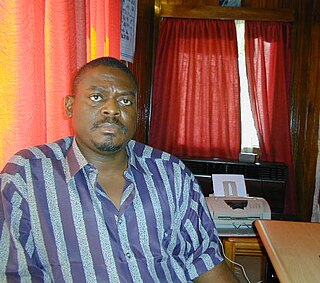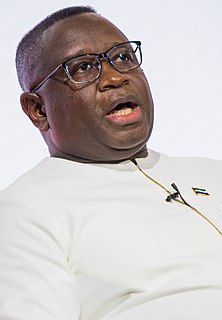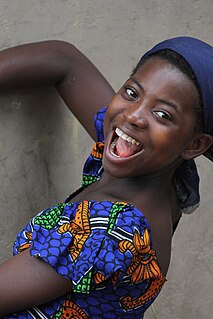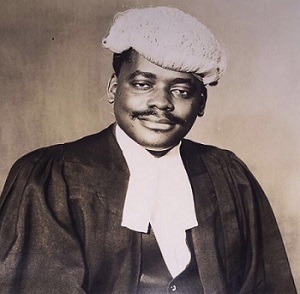Related Research Articles

Sierra Leone, officially the Republic of Sierra Leone, informally Salone, is a country on the southwest coast of West Africa. It is bordered by Liberia to the southeast and Guinea to the northeast. Sierra Leone has a tropical climate with a diverse environment ranging from savanna to rainforests, a total area of 71,740 km2 (27,699 sq mi) and a population of 7,092,113 as of the 2015 census. The capital and largest city is Freetown. The country is divided into five administrative regions which are subdivided into sixteen districts. Sierra Leone is a constitutional republic with a unicameral parliament and a directly elected president. Sierra Leone is a Muslim-majority country at approximately 78%, though with an influential Christian minority at about 21%. Muslims and Christians in Sierra Leone are extremely tolerant of each other, and all the major Muslim and Christian holidays are officially national holidays in the country.

The Republic of Sierra Leone Armed Forces (RSLAF) is the armed forces of Sierra Leone, responsible for the territorial security of Sierra Leone's border and defending the national interests of Sierra Leone, within the framework of its international obligations. The armed forces were formed after independence in 1961, on the basis of elements of the former British Royal West African Frontier Force, then present in the country. The Sierra Leone Armed Forces currently consist of around 13,000 personnel.

Alhaji Ahmad Tejan Kabbah was a Sierra Leonean politician who served twice as the 3rd President of Sierra Leone, from 1996 to 1997 and again from 1998 to 2007. An economist and attorney by profession, Kabbah spent many years working for the United Nations Development Programme. He retired from the United Nations and returned to Sierra Leone in 1992.

Major Johnny Paul Koroma was the head of state of Sierra Leone from May 1997 to February 1998. His alleged death has not been proven as nobody has found his body, hence he cannot be legally deemed to be dead. He was quite instrumental in engaging the RUF rebels in securing peace during the Sierra Leone Civil War.

Makeni is the largest city in the Northern Province of Sierra Leone. The city is the capital of Bombali District, and is the economic center of the Northern Province. Makeni is the fifth largest city in Sierra Leone by population. The city of Makeni had a population of 80,840 in the 2004 census and a 2013 estimate of 112,428. Makeni lies approximately 110 miles east of Freetown. Makeni is home to the University of Makeni, the largest private university in Sierra Leone.

Julius Maada Bio is a Sierra Leonean politician, and the current president of Sierra Leone since April 4, 2018. He is a retired Brigadier General in the Sierra Leone Army and was the military Head of State of Sierra Leone from January 16, 1996, to March 29, 1996 in a military Junta government. As the candidate of the main opposition Sierra Leone People's Party, Bio defeated Samura Kamara of the ruling All People's Congress in the runoff vote of the 2018 Sierra Leone presidential election with 51.8% of the votes to Kamara's 48.2%. International and local observers declared the election free and fair. Bio succeeded Ernest Bai Koroma as president. As the main opposition leader, Bio was a critic of his predecessor president Ernest Bai Koroma and his administration. As president, Bio has overturned most of the policies of Ernest Bai Koroma, whom he accuses of corruption, and the two men rarely speak to each other.
Charles Francis Kondo Margai is a Sierra Leonean politician and constitutional lawyer who served as Attorney General and Minister of Justice of Sierra Leone in 2018.
Solomon Ekuma Dominic Berewa was Vice-President of Sierra Leone from May 2002 to September 2007. Standing as the candidate of the Sierra Leone People's Party (SLPP), he was defeated in the second round of the 2007 presidential election by Ernest Bai Koroma of the All People's Congress (APC).

The Special Court for Sierra Leone, or the "Special Court" (SCSL), also called the Sierra Leone Tribunal, was a judicial body set up by the government of Sierra Leone and the United Nations to "prosecute persons who bear the greatest responsibility for serious violations of international humanitarian law and Sierra Leonean law" committed in Sierra Leone after 30 November 1996 and during the Sierra Leone Civil War. The court's working language was English. The court listed offices in Freetown, The Hague, and New York City.

Ernest Bai Koroma is a Sierra Leonean politician who served as the fourth President of Sierra Leone from 17 September 2007 to 4 April 2018.

General elections were held in Sierra Leone on 11 August 2007. Seven candidates competed in the first round of the presidential election; no candidate received the necessary 55% of the vote to win in the first round, and a second round was held between the top two candidates, Ernest Bai Koroma of the All People's Congress (APC) and Solomon Berewa of the Sierra Leone People's Party (SLPP), on 8 September. According to official results, Koroma won the election with 54.6% of the vote.
The following list is of events that happened during 2007 in Sierra Leone.
Alhaji Samuel Sidique Sam-Sumana is a Sierra Leonean politician who was the Vice President of Sierra Leone from September 17, 2007 to March 17, 2015. Sam-Sumana stood as the vice-presidential candidate of the All People's Congress (APC) in the 2007 presidential election, alongside presidential candidate Ernest Bai Koroma. The APC ticket defeated the Sierra Leone People's Party (SLPP) presidential candidate Solomon Berewa and vice presidential candidate Momodou Koroma. Sam-Sumana took office as vice president on September 17, 2007.

Sierra Leone, officially the Republic of Sierra Leone, is a Constitutional Republic in West Africa. Since it was founded in 1787, the women in Sierra Leone have been a major influence in the political and economic development of the nation.
Salamatu Koroma is a Sierra Leonean judge and a current Justice in the Supreme Court of Sierra Leone. She was appointed as a Supreme Court Justice by Sierra Leone's President Ernest Bai Koroma, and was sworn in on December 5, 2011 after she was confirmed by the Sierra Leone parliament.
Abdulai Hamid Charm is a Sierra Leonean judge, who was formerly the Chief Justice of Sierra Leone until his resignation in December 2018.

Vivek Maru is an American social entrepreneur and human rights activist who is a pioneer in the field of legal empowerment. He is currently the CEO of Namati, which he founded in 2011. Namati and its partners have supported cadres of grassroots legal advocates – sometimes known as "barefoot lawyers" or "community paralegals"– in ten countries. These advocates equip their communities to protect common lands, enforce environmental law, and secure basic rights to healthcare and citizenship.

James Blyden Jenkins-Johnston, G.C.O.R. was a lawyer in Sierra Leone known for his pursuit of the advancement of ordinary Sierra Leoneans through governance-challenging social commentary; defending human rights, constitutionalism and the rule of law; and personal philanthropy. He was a steadfast champion of workers’ rights, and legal adviser to the Sierra Leone Labour Congress for over 30 years.
Access to justice initiatives and programs are designed to provide legal services to populations that may otherwise have difficulty obtaining legal advice and representation. Without access to justice, people are not able to fully exercise their rights, challenge discrimination, or hold decision-makers accountable for their actions.
Raymond Desmond Aderemi Renner-Thomas or Ade Renner-Thomas is a former Chief Justice of Sierra Leone.
References
- ↑ Timap for Justice: Our Work Archived 2009-05-11 at the Wayback Machine
- 1 2 Timap for Justice: Staff List Archived 2009-04-08 at the Wayback Machine
- ↑ Between Law and Society: Paralegals and the Provision of Justice Services in Sierra Leone and Worldwide Archived 2011-07-28 at the Wayback Machine Yale Journal of International Law, Vol. 31
- ↑ World Bank Awards Grant to Pioneering African Paralegal NGO OSJI Announcement
- ↑ Grassroots Social Justice: providing citizens with advice in Sierra Leone Law Society of England and Wales
- 1 2 Reconstructing the Rule of Law [ permanent dead link ] Jimmy Carter in the Harvard International Review
- ↑ Global Corruption Report 2007 Transparency International